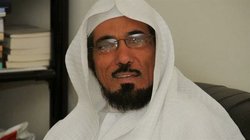 Amnesty International has warned the Saudi regime against executing prominent Muslim cleric Sheikh Salman al-Awdah, calling on Riyadh to drop the politically-motivated charges leveled against the dissident and release him from jail.
Amnesty International has warned the Saudi regime against executing prominent Muslim cleric Sheikh Salman al-Awdah, calling on Riyadh to drop the politically-motivated charges leveled against the dissident and release him from jail. RNA - Lynn Maalouf, the Middle East Research Director at Amnesty International, said on Friday that the London-based human rights organization has serious concerns that the 61-year-old clergyman could be sentenced to death and executed, when he stands trial at the so-called Specialized Criminal Court in the capital Riyadh on July 28.
“We are gravely concerned that Sheikh Salman al-Awdah could be sentenced to death and executed. Since his arrest almost two years ago, Sheikh al-Awdah has gone through a terrible ordeal, including prolonged pre-trial detention, months of solitary confinement, incommunicado detention, and other ill-treatment – all flagrant violations to his right to a fair trial,” Maalouf said.
She further highlighted that Sheikh al-Awdah’s forthcoming trial as well as those of other activists, including the 37 men who were executed last April, are politically-motivated and meant to silence independent voices in Saudi Arabia.
“Sheikh al-Awdah has been calling for a more inclusive society that would end the marginalization of Saudi Shia citizens. For this, he is being punished. In the same way, women and advocates of women’s rights, who have called for greater rights, are similarly being punished. What gains are the authorities hoping to achieve by treating their own citizens this way? Instead of moving ahead with this sham trial, they must immediately and unconditionally release Sheikh al-Awdah and drop all charges against him,” Maalouf pointed out.
The Arabic-language Saudi newspaper Okaz reported on September 4, 2018 that Saudi public prosecutors had leveled 37 counts against Awdah, and even demanded his execution.
Awdah is the assistant secretary general of the International Union of Muslim Scholars (IUMS), which the Riyadh regime has listed as a terrorist organization.
Saudi authorities detained the prominent Muslim scholar on September 7 last year, and have been holding him in solitary confinement without charge or trial ever since. Officials have imposed travel bans on members of his family as well.
A family member told Human Rights Watch that the distinguished cleric was being held over his refusal to comply with an order by Saudi authorities to tweet a specific text to support the Saudi-led blockade of Qatar.
According to Press TV, Awdah, instead, posted a tweet, saying, “May God harmonize between their hearts for the good of their people,” - an apparent call for reconciliation between the Persian Gulf littoral states, the US-based rights group said in a statement.
Saudi Arabia, the United Arab Emirates, Bahrain and Egypt all cut off diplomatic ties with Qatar on June 5 last year, after officially accusing it of “sponsoring terrorism.”
Qatar said the move was unjustified and based on false claims and assumptions.
Saudi Arabia has lately stepped up politically-motivated arrests, prosecution and conviction of peaceful dissident writers and human rights campaigners.
Saudi officials have also intensified security measures in the Shia-populated and oil-rich Eastern Province.
Over the past years, Riyadh has also redefined its anti-terrorism laws to target activism.
In January 2016, Saudi authorities executed Shia cleric, Sheikh Nimr Baqir al-Nimr, who was an outspoken critic of the policies of the Riyadh regime. Nimr had been arrested in Qatif in 2012.
847/940